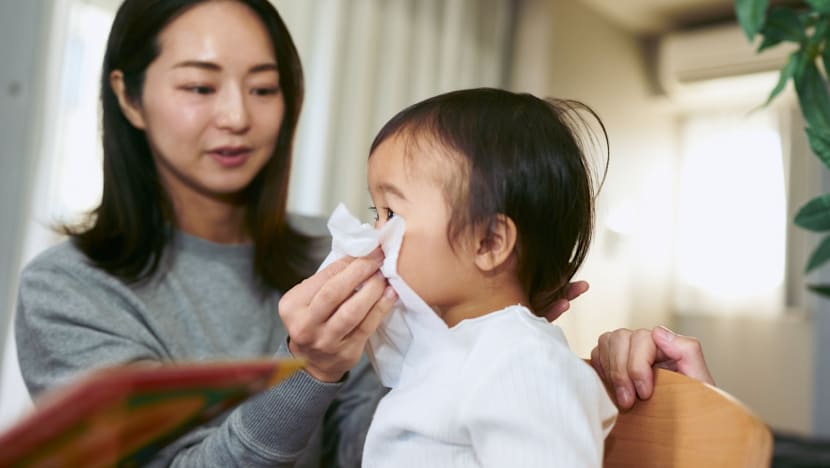Health
Understanding RSV: A Growing Concern for Infants in Singapore

Every year, the respiratory syncytial virus (RSV) circulates among infants in Singapore, often masquerading as a common cold. While it may seem harmless, RSV can lead to significant health complications, necessitating hospital care for vulnerable infants. According to data from the Communicable Diseases Agency (CDA), RSV ranks among the top paediatric viruses detected in local polyclinics for children with acute respiratory infections. A study published in Emerging Infectious Diseases highlights that RSV is a leading cause of hospital admissions for acute lower respiratory tract infections in young children, especially those under six months and toddlers up to 29 months.
Globally, the World Health Organization (WHO) estimates that RSV results in more than 3.6 million hospitalisations and approximately 100,000 deaths each year in children under five.
Symptoms and Complications of RSV
RSV is highly contagious, spreading through airborne droplets when an infected person coughs or sneezes. In older children and adults, it typically causes mild symptoms. In infants, however, the virus can lead to severe complications, particularly breathing difficulties that may require hospitalisation. Symptoms generally emerge within four to seven days after exposure and include a runny nose, sore throat, headache, fatigue, and fever.
As the illness progresses, symptoms may intensify, leading to coughing, shortness of breath, rapid breathing, wheezing, and bronchospasm, which is the tightening of the muscles around the airways. Professor Juan Pablo Torres, a paediatric infectious diseases specialist, notes that RSV may initially present subtly in infants, such as decreased feeding. “In the following days, they start having respiratory symptoms, especially cough,” he stated. In severe cases, infants can develop polypnea, or rapid breathing, which could lead to respiratory failure, requiring hospitalisation and oxygen support.
The Broader Impact of RSV on Infant Health
Professor Torres, who works at the Children’s Hospital Luis Calvo Mackenna in Santiago, Chile, points out that nearly all children worldwide are infected with RSV by age two. This includes healthy, full-term infants. “We are dealing with a virus that is very common,” he explained. “Unlike some infections where attention is focused on high-risk groups, RSV often affects healthy infants. It is the main cause of bronchiolitis and pneumonia in this age group, with around 70 to 80 percent of RSV-related hospitalisations involving infants without underlying conditions.”
While most children recover, the potential for long-term effects exists. Professor Torres cautions that about 20 to 30 percent of affected infants may develop asthma or airway hyper-reactivity later in life.
Advancements in RSV Prevention
After years of limited preventive options, new developments are providing more ways to protect young children from RSV. In 2024, Chile became the first country in the Southern Hemisphere to implement a national RSV immunisation strategy. Over six months, a state-funded programme administered a single dose of targeted monoclonal antibody immunisation to more than 150,000 infants under six months, including both healthy full-term babies and those at higher risk, such as pre-term infants with congenital heart conditions.
Findings published in The Lancet Infectious Diseases reported an almost 80 percent reduction in RSV-related hospitalisations, with no RSV-related deaths recorded in children under one year, a significant drop from 13 deaths the previous year.
Experts in Singapore also recognise the need for enhanced protection against RSV. A recent panel of paediatricians published an expert consensus urging that immunisation be considered for inclusion in the National Immunisation Programme to alleviate the RSV burden on the healthcare system.
With more immunisation options emerging, there is growing momentum to strengthen early defences against RSV. Professor Torres believes that fostering public trust through education is critical. “Healthcare professionals play a vital role in sharing evidence-based information with families,” he noted.
In Singapore, hygiene practices remain essential in combating RSV. The CDA recommends regular handwashing, wearing masks when unwell, and avoiding close contact with those who are sick. Parents are also encouraged to keep unwell children out of school or childcare settings to prevent further transmission.
As preventive tools continue to evolve, families and healthcare professionals now have additional means to protect vulnerable infants from RSV. “When it comes to RSV, early action, shared understanding, and informed choices can make a meaningful difference,” said Professor Torres.
For concerns regarding infant health, parents are advised to consult healthcare professionals about available preventive measures, including immunisation. For more information, visit TogetherAgainstRSV.sg.
-

 Lifestyle4 months ago
Lifestyle4 months agoHumanism Camp Engages 250 Youths in Summer Fest 2025
-

 Business5 months ago
Business5 months agoKenvue Dismisses CEO Thibaut Mongon as Strategic Review Advances
-

 Sports4 months ago
Sports4 months agoDe Minaur Triumphs at Washington Open After Thrilling Comeback
-

 Sports5 months ago
Sports5 months agoTupou and Daugunu Join First Nations Squad for Lions Clash
-

 Top Stories5 months ago
Top Stories5 months agoColombian Senator Miguel Uribe Shows Signs of Recovery After Attack
-

 World5 months ago
World5 months agoASEAN Gears Up for Historic Joint Meeting of Foreign and Economic Ministers
-

 Health4 months ago
Health4 months agoNew Study Challenges Assumptions About Aging and Inflammation
-

 Business5 months ago
Business5 months agoOil Prices Surge Following New EU Sanctions on Russia
-

 Entertainment4 months ago
Entertainment4 months agoDetaşe-Sabah Violin Ensemble Captivates at Gabala Music Festival
-

 Entertainment4 months ago
Entertainment4 months agoBaku Metro Extends Hours for Justin Timberlake Concert
-

 Top Stories5 months ago
Top Stories5 months agoRethinking Singapore’s F&B Regulations Amid Business Closures
-

 Business5 months ago
Business5 months agoU.S. House Approves Stablecoin Bill, Sends to Trump for Signature









